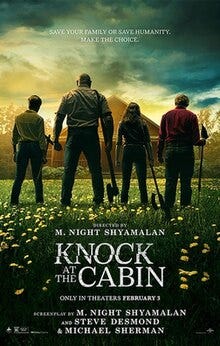I recently watched Knock at the Cabin (which is a bit of an odd title) on Peacock. I was drawn to it primarily to see David Bautista in a serious/non-comic book role. I didn’t know much about it beyond seeing one of the trailers. This isn’t really a review of the movie per se, though I will give you my thoughts on it. Let me give a spoiler warning since I’ll be discussing the ending of both the movie and the book, The Cabin at the End of the Wood (a much better title).
Overall, it wasn’t too bad. I think all of the actors, especially Kristen Cui who played the seven year old Wen, did a good job with the material they had. I would have liked to see the four strangers fleshed out a little more. I understand why Shyamalan may have wanted to keep bits of them under wraps, but they all felt a little flat. I was particularly impressed with Bautista’s range, given his acting experience so far. The plot was engaging and the tension was well done. I was kept guessing about the strangers’ real motivations until maybe the last ten minutes or so. The pacing was… gentle? Which seems weird to say about something that was supposed to be a thriller. And I did feel the tension. In spite of the premise, everyone felt like they were in danger until the end.
The end is what I’m here to talk about.
The movie ended with the two dads making a choice to stop the world coming to an end. They sent Wen to a treehouse to wait and after arguing about it, Eric is sacrificed, though we’re not sure who fires the shot taking his life. The sacrifice works immediately, though we are taken through a couple of minutes of did it/didn’t it before we know. Thus, we know the “Four Horsemen” were telling the truth the whole time.
I may eventually read the book, but I wanted to know how the book differed from the movie. So, I read the book’s wikipedia page. The biggest difference (and it’s a biggie) is Wen is accidentally shot and we’re told this won’t stop the apocalypse. It has to be voluntary. The “Horsemen” off themselves and the two dads decide that any higher power who wouldn’t take such an innocent’s life as being worthy. accidental or not, isn’t worth making a willing sacrifice to. They walk off into the apocalypse together, braving whatever comes.
Of the two endings, I know which one I’d prefer. While I certainly think the movie’s ending works in a “feel good” kind of way (if you can feel good after watching a good chunk of the Earth die), it also feels very safe. Eric is established to be a man of faith, so it makes sense that he’d buy into the idea of something bigger behind the apocalypse sooner than Andrew. He “sees something” in a flash of light when the first Horseman is sacrificed. It’s a person, or so he comes to believe. So, when he says he feels good about giving up his life, it makes a certain kind of sense. Then again, he almost certainly has a concussion, something that gets pointed out more than once. The whole thing could very well be brain damage, and the apocalypse could still be coincidental. Though that seems unlikely.
The book’s ending, which again I haven’t read, feels a bit more real. The whole time, everyone is on a knife’s edge and in the movie the worst thing that happens is Andrew gets slightly injured and one of the Horseman gets killed, but it’s on time so there’s no impact. The one “hero” death in the movie is a willing sacrifice and we’re told how it will all work out in the end. In the book, a child is killed (which is risky, given how a lot of audience members will feel about that) and nothing is gained by it. And in the end, we don’t know what will happen as the two mourning dads walk into the darkness. That’s not a safe, Hollywood ending. It’s a horror story, one hundred percent.
I guess it shouldn’t surprise me. Shyamalan doesn’t seem to be a big proponent of horrific endings. Of course, people die in his films, but it always feels pretty safe to be a main character in his script. I suppose there are exceptions since the MCs do die at the end of Glass, but even then Glass gets what he wants.
I think it all comes down to what a screenwriter/director (in this case Shyamalan was both) wants to accomplish with their movie. I don’t think to make a good adaptation you have to make a slavish copy of the source. You should feel free to take some license with it, give it your own touch. However, when you’re adapting something like a Bram Stoker Award winning novel, you may want to hew closer to the climax of the book. There’s no doubt a reason why it worked.





